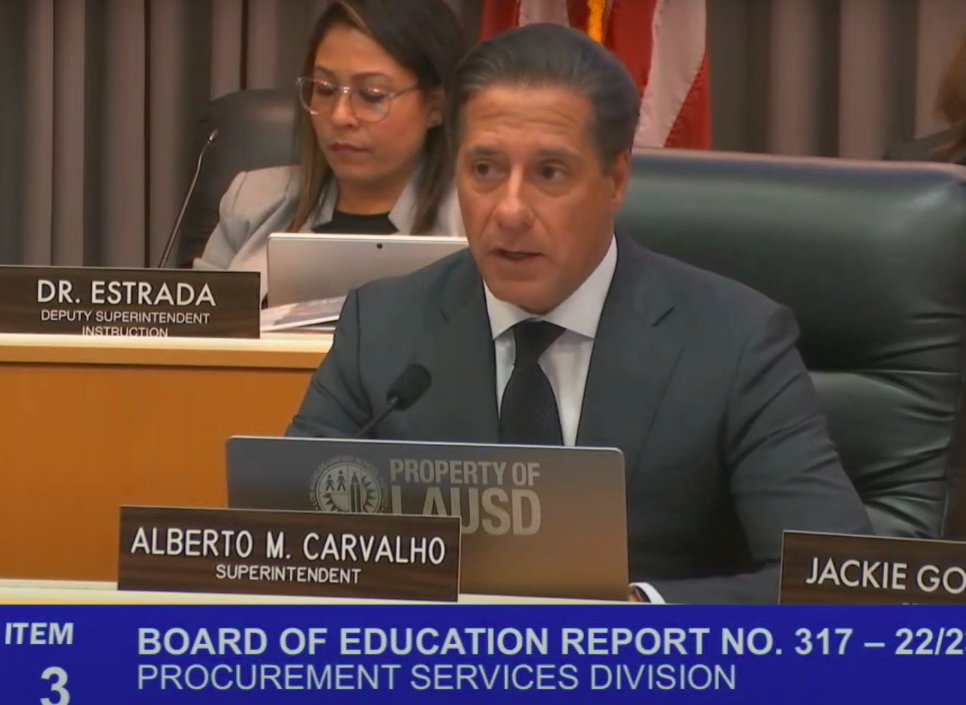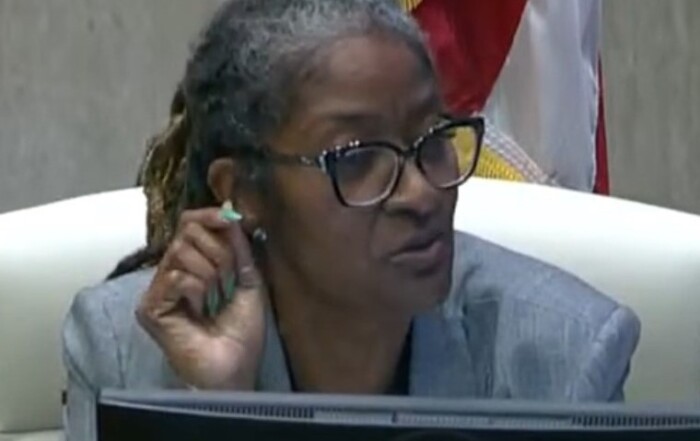District priorities and budgeting practices have once again attracted significant scrutiny in L.A. Unified. As teachers and parents rallied against budget cuts and raised concerns around district spending, L.A. Unified began building a $6 Million AI-powered chatbot.
AllHere Education, the education technology company responsible for Los Angeles Unified School District’s (LAUSD) AI chatbot, nicknamed “Ed,” abruptly announced it had furloughed much of its staff due to its financial position last month. Its CEO and founder Joanna Smith-Griffin is no longer with the company. L.A. Unified said it had already paid the company around $3 Million. Only three months after the company’s most ambitious project to date was unveiled, it was over.
AllHere had been thoroughly feted this year – a contract with L.A. Unified, the second-largest school district in the country, significantly raised its profile. Ed, a cartoon avatar for the AI-powered platform, was rolled out by the district in March. After some months of testing, L.A. Unified introduced the chatbot to 55,000 students and families.
Ed was marketed as a “Personal assistant” for LAUSD students. With its adaptive artificial intelligence technology, Ed would “Personalize the educational journey for every single student,” according to Superintendent Alberto Carvalho.
AI is a slippery concept. The Federal Trade Commission called it a marketing term – there is no uniform definition and it’s used to describe a wide range of products.
Ed, or as Carvalho sometimes called it, “the entity,” first surfaced publicly last year in the form of a contract that slipped by relatively unnoticed. It is unclear exactly who first conceived of Ed, but it is clear who championed it. What’s less certain is how a company with apparent instability and alleged security failures came to LAUSD.
Carvalho was front and center during the press roll-out for Ed. During an April podcast appearance, Carvalho said Ed “Humanizes and democratizes” education in L.A. Unified. Ed is “Everything to everyone,” he said, but also not a replacement for teachers and counselors, though Ed was marketed as an academic and emotional aide. In April, Carvalho estimated that LAUSD would expand Ed to all 540,000 LAUSD students in a matter of weeks.
“Ed began as a dream that I had prior to arriving in Los Angeles,” Carvalho said, adding that he had long been obsessed with using technology to improve academic performance.
At a board meeting in June 2023, AllHere was just one of a slew of companies in the long list of contracts to be approved by the district. The Board approved the contract for AllHere to develop and maintain an Individual Acceleration Plan tool, one that would combine all of LAUSD’s systems of analysis and data points into one platform. The contract awarded $6 Million to AllHere over five years. Its approval prompted little discussion. Westside board member Nick Melvoin asked for clarity about the procurement process for contracts – LAUSD requested proposals for this project and seemed to get few responses even though hundreds of tech companies offer similar services.
Superintendent Carvalho said the district struggled with the procurement process which benefits “Disproportionately, fairly or unfairly, legacy contractors that already have a footprint with the system.” Carvalho made an allusion to AllHere’s AI attendance tracking product in his explanation.
But AllHere is not apparently a legacy contractor with LAUSD. Before their 2023 contract, AllHere appears to have had no relationship with the district. A researcher who wound up on the advisory board of AllHere conducted a study in one LAUSD school back in the 2010-11 school year.
AllHere does have a relationship with Miami-Dade County Public Schools (M-DCPS). The company began operating in some schools in the district while Carvalho was superintendent there.
AllHere began as a text-messaging system that used automation to send messages to families about student absences, grades, and missing assignments. This wasn’t an entirely novel idea – school districts have sent automated messages to families about student absences for more than a decade. LAUSD already provides this information to families.
At the beginning of the pandemic, as thousands of people died and school instruction moved online, then-CEO Smith-Griffin saw a “Window of opportunity” for AllHere. Tech business was booming as school districts struggled to transition to virtual teaching. In 2021, Smith-Griffin told Forbes that the company’s pandemic-focused messaging had paid off – the business was expanding and districts were paying $2 per student for an AllHere chatbot. “My goal over the next 12 months is a land grab,” she said.
Using crises to facilitate corporate takeovers is a regular phenomenon. Naomi Klein calls this “the shock doctrine” – Milton Friedman’s dismantling of public education in New Orleans in the wake of Hurricane Katrina is one notorious example.
AllHere won a contract with M-DCPS in 2022 after an investigation prompted by an anonymous complaint caused the school district to rescind its initial contract with another company, Public Consulting Group (PCG). PCG was initially contracted to help the district track down its chronically absent students. The company took a boots-on-the-ground approach: teachers would be paid for knocking on doors and making phone calls to students who’d been missing from school.
AllHere said they could provide the same service for cheaper. AllHere’s model notably removed the need for physical or analog engagement with students and, it claimed, the associated costs of paying workers for their efforts. AllHere eventually secured their contract with the district that fall.
In January, AllHere donated an undisclosed amount to a Miami-based non-profit founded by Carvalho. The Foundation for New Education Initiatives raises funds for M-DCPS and it’s run by district leadership. AllHere has donated to M-DCPS multiple times since it began operating in the district. As recently as April 25, M-DCPS thanked AllHere for its generous support.
Taken at face value, this history suggests a relationship that differs from the “District to legacy contractor” relationship Carvalho described to the Board.
A spokesperson from L.A. Unified declined to respond to specific inquiries about the procurement process from Westside Voice. In a statement, the spokesperson said “Los Angeles Unified was recently informed of a leadership change at AllHere and understands that several educational technology companies are interested in acquiring it. The District will continue making Ed available as a tool to its students and families and is closely monitoring the potential acquisition of AllHere.”
This isn’t the first time that Carvalho has been involved in expensive and chaotic tech projects. During his tenure in Miami, a large donation made to the Foundation for New Education Initiatives was investigated by the Office of the Inspector General (OIG). The donor was K12, an education tech company that notoriously failed to deliver when it was contracted by M-DCPS to facilitate virtual instruction at the beginning of the pandemic. The donation came just as the Board was set to vote on whether or not to continue their contract with K12, raising concerns about donors getting preferential treatment in the procurement process.
The OIG ultimately ruled that no violations had occurred but that there was an “Appearance of impropriety.”
Critics have argued that Carvalho’s leadership during K12 and AllHere’s failures constitute a pattern of questionable decision-making.
The problem with private capital
On June 12, two days before the company announced it was furloughing its staff, a patent filed by AllHere was rejected by the United States Patent and Trademark Office (USPTO). The patent AllHere submitted was for an AI chatbot they created before Ed. The chatbot was also for school usage and claimed to address behavioral problems like attendance and missing assignments through various automatic and reactive means of interacting with students.
In a promotional video for the USPTO, Smith-Griffin said patenting intellectual property was key to maximizing profits. “It is very hard to reap the full benefits of your inventions and your R&D [research and development] investments” without a patent,” she said.
AllHere claimed it used innovation to address systemic failures. Its products would engage students who were historically underserved by school districts – a corrective tool for inequities that required little effort.
CEO Joanna Smith-Griffin’s focus on equity certainly aligned with the district – but the decision to deny AllHere’s patent determined a solution to inequitable access to resources and services ultimately cannot be found in a chatbot. “Managing student engagement by identifying and resolving underlying causes for behavior and other schooling issues is not a technical problem, but a mankind problem,” said the USPTO in its decision.
The USPTO also denied the patent because AllHere’s patent “Merely describes what humans do in the analog and is not providing any technical advancements,” and uses “Generic, well-known, and conventional data gathering computing elements as a tool.”
The exact cause of AllHere’s breakdown is unknown. In a statement, the company only alluded to its financial troubles. Its inability to maximize profit for its venture capitalist funders could have been a contributing factor. AllHere did not respond to Westside Voice’s request for comment.
Critics of tech incursions into education have said that these companies, in spite of their mission statements, can’t actually serve the public good and private capital at the same time. Code.org, of which Carvalho is a board member and LAUSD is a district partner, aims to provide computer science education to students. Code.org’s major funders are tech behemoths like Amazon and Microsoft, and critics say that the organization’s work is self-serving – the organization is attempting to specifically train future Amazon and Microsoft workers.
AllHere and other companies with AI offerings take a different approach to labor – it claims its products are light on labor and cost-effective. But the reality of AI is that of course, human labor creates and powers it. Though AI tech requires exponentially more energy than regular computing does, it also requires staff for daily upkeep and as the phrase machine-learning suggests, it requires thousands of hours of human interaction to approach some semblance of intelligence. “It learns you,” Carvalho said. Ed needed time and input to mature, he added.
During a presentation on Ed in April, Carvalho said “Because we are equity-driven, Ed is in the hands of every single student in the 100 priority schools in Los Angeles Unified.” Carvalho’s priority schools are the lowest performing in the district. Priority schools teach students that are majority Black, Brown, and have high rates of poverty.
Experts say that testing AI technologies on marginalized students causes immense harm and perpetuates inequities. For the Center for Law and Social Policy, civil and human rights attorney Clarence Okoh wrote, “Public and private actors are turning to artificial intelligence (AI) and other big data technologies to engineer new futures for structural racism and social inequality.” The “New Jim Code,” so-named by sociologist Ruha Benjamin, criminalizes and surveils marginalized students through educational tech like Ed.
AllHere touts a “Human in the loop” design – humans monitor and moderate Ed, ensuring that inappropriate or incorrect responses from the chatbot are corrected and recorded. AllHere also promised that the chatbot, with the intervention of human workers, would be able to detect and appropriately report messages from students that would require intervention from a counselor or another adult. “Trained, background-checked staff work 24/7 in tandem with automated escalations from the chatbot for emergent situations,” AllHere said.
Though LAUSD said in a statement that Ed will still be available to users, it is unclear who is operating it. Whatever intelligence Ed possesses and whatever safeguards are in place ultimately arise from human labor – something AllHere now ostensibly lacks. The $6 Million deal included continued maintenance and fine-tuning from AllHere engineers.
U.S. Representative Ted Lieu, who represents a great deal of the Westside, weighed in last week: “With AI, there will be good things, and there will be hype and disasters. LAUSD’s experience with a company developing a chatbot is a cautionary tale. LAUSD paid $3 million. The company went out of business and allegedly violated students’ privacy.”
In a statement, L.A. Unified said “Throughout the development of the Ed platform, Los Angeles Unified has closely reviewed the platform to ensure compliance with applicable privacy laws and regulations, as well as Los Angeles Unified’s own data security and privacy policies, and AllHere is contractually obligated to do the same.” Last Friday United Teachers Los Angeles President Cecily Myart-Cruz called for an outside investigation into the “Chatbot fiasco” and for the district to collectively bargain on AI initiatives moving forward. In a statement, she said “Despite the ongoing struggle to secure funding for proven programs that support student success—such as hiring more educators, campus aides, program coordinators, and expanding Community Schools and the Black Student Achievement Program—the district chose to risk $6 million on an AI initiative. This situation erodes our confidence in how the district will allocate future resources for our students.”
Image of Superintendent Carvalho obtained by screen capture.
Stay informed. Sign up for The Westside Voice Newsletter
By clicking submit, you agree to share your email address with Westside Voice. We do not sell or share your information with anyone.








